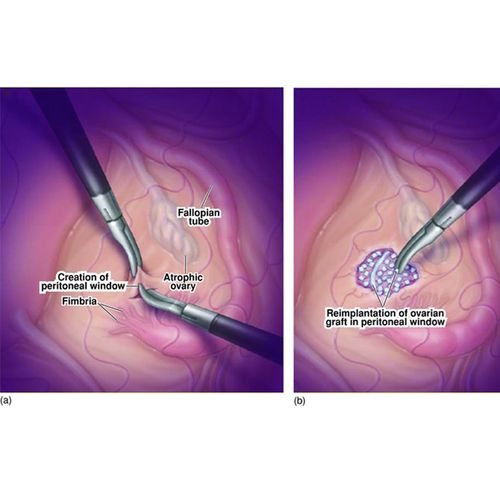Surgery to transplant a woman's entire ovary to her upper arm can preserve fertility in patients undergoing radiation treatments that leave them prematurely menopausal, according to a new report.
Researchers from the Netherlands and South America have performed the second successful human ovarian autotransplant, a technique that could offer hope to women who have cancer and have become infertile after undergoing radiation treatments that damage their ovaries, say the scientists.
The Trial
Dr. Carina Hilders, lead author of the report, and her team removed a woman's ovary with some blood vessels attached and transplanted it into her upper arm, connecting the ovarian blood vessels to the blood vessels in the arm.
Hilders, a physician at Leiden University Hospital in the Netherlands, says this new method doesn't require developing a "donor site," or pocket, in the arm, which was done for the first transplant and took several months. The new method can be done at the time of the cancer treatment.
Hilders says the woman's ovarian function has been maintained for more than a year, but she has not become pregnant. Longer followup is needed to prove the long-term feasibility of this approach. The hope is that eggs could be retrieved from the transplanted ovary and then fertilized in a laboratory, she says.
A Different Approach
Other researchers, including those in the US, have already performed ovarian transplants to the arm to preserve fertility, but using a different method. They removed strips of ovarian tissue before the cancer treatment, froze the strips and then transplanted them years later, notes Hilders.
In September 2004, a Belgian woman gave birth to a healthy girl after her ovarian tissue had been transplanted back into her. She had "banked" frozen pieces of ovarian tissue in 1997 before undergoing chemotherapy and radiation for Hodgkin's lymphoma.
However, Hilders says that transplanting the entire organ may result in a better blood supply.
Wait And See?
Several transplant experts are waiting for more data before they draw any conclusions from the new findings.
Dr. Kutluk Oktay, a pioneer in ovarian tissue transplant, and an associate professor of reproductive medicine at Weill Medical College of Cornell University in New York City, says, "This approach is only feasible for a woman who is going to receive only radiation to the ovarian area, not for a woman who gets chemotherapy, because chemo reaches the ovaries regardless of where they are placed."
Another expert, Dr. Craig Witz of the University of Texas Health Science Center at San Antonio, says the new report is cutting edge," but notes that the preservation of a woman's fertility after cancer treatment is an evolving science.
"The best approach has not yet been established," says Witz, chief of the division of reproductive endocrinology and infertility at the University and a spokesman for the American Society for Reproductive Medicine.
"This is all considered experimental therapy at present." Witz notes. "However, there are enough centers around the country with the surgical expertise to attempt these sorts of surgical and experimental approaches that the patient should ask."
